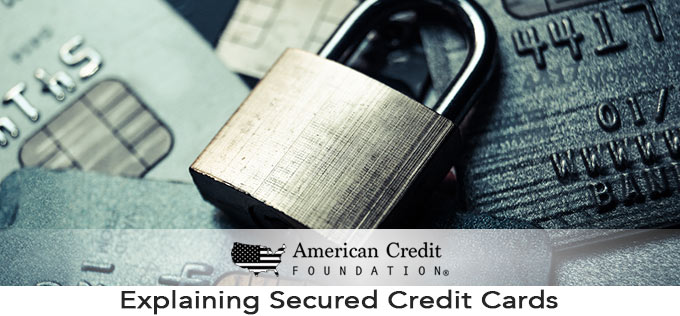
When most people think of a credit card, they imagine a card that allows them to charge things now by taking out a temporary “loan” from the credit card issuer and paying it back later. These are known as unsecured credit cards. But they aren’t the only option. If you’re building – or rebuilding – your credit, secured credit cards are a tool you should explore.
What Are Secured Credit Cards?
Secured credit cards are accepted anyplace unsecured credit cards are, and because they look like a regular credit card, no one but you will know that they are secured. But there is one exception: The holder of the card puts up a deposit that the lender uses if the balance isn’t paid. Think of it like a security deposit on a rental apartment: The deposit isn’t used to pay for purchases but is held as “protection” for the lender.
The deposit is refundable, but how it’s refunded depends on the credit card issuer. Some of the more common ways are:
- Once the credit card is closed, the card issuer will refund the deposit.
- If the borrower pays their bill on time every month, the issuer may begin refunding portions of the deposit over time – as long as the monthly bills continue to be paid on time.
Sometimes, depending on a person’s credit, the credit card issuer will give the borrower a higher line of credit than the total of the deposit.
Like traditional unsecured credit cards, you will pay interest on any balance you carry over on a secured credit card, which makes it that much more important to pay off your balance in full each month. The upshot? Because you have to make a deposit to use your secured card, you can avoid the trap of seeing the card like “free money.” And depending on your credit history, the card limit is likely to be much lower than a typical unsecured card. All of this lessens the risk of overspending.
How Can I Get a Secured Credit Card
Just like with any other credit card, you have to apply and be approved for a secured credit card. The card issuer will take your credit score, along with other financial details, into consideration when making the decision. Those factors will also determine the amount of deposit you have to make and your credit limit.
Who Benefits From Secured Credit Cards?
There are three types of borrowers who will benefit from secured credit cards.
- People with no credit. A college graduate or someone else with no credit history is a perfect fit for a secured credit card. They can use them to build a credit file by paying the card on time every month.
- People with bad credit. People who have had derogatory marks on their credit history need to take steps to repair it, to make sure that they can qualify for important future credit such as mortgages or car loans. One way to do that is to use secured cards responsibly to rebuild credit.
- People who want to be safe. Some people have gotten into trouble with out-of-control debt in the past and don’t want to risk having an unsecured credit card because they are afraid they will drive up their debt again. Secured cards are a great way for them to enjoy the convenience of a card without the risk of overspending.
How Do Secured Credit Cards Differ From Debit and Prepaid Cards?

At first glance, secured credit cards seem similar to both debit cards and prepaid cards. But there are some important differences in how the cards operate.
- Debit cards are linked to a checking account, and when you make charges on the card, those are automatically deducted from your bank account.
- Prepaid card issuers don’t extend credit to the user but instead provide a card in exchange for equal payment. The card’s balance decreases as you use it, and once it’s empty, you have to deposit more money to use it again.
Neither prepaid cards nor debit cards help you build credit because your activity with those types of cards is not reported to any of the three main credit agencies.
How Do I Use a Secured Credit Card?
Because the primary purpose for using a secured credit card is to establish or build a credit history, it’s important to keep that in mind when using the card. Don’t rely on the card – use it sparingly, and only make small purchases that will accomplish that goal.
Here are some other good practices that will help you make the most of your secured credit card:
- Always pay your bill on time. If you can, pay off the entire balance every month to avoid any fees and interest.
- Be careful not to run up a balance that you will have a difficult time paying off.
- If the issuer gives you a deadline for making a deposit, don’t miss it. If you do, they may cancel the card and close your account.
- Make sure you know what your balance is. If you go over it, your purchase may be declined by the credit card issuer.
Once you have paid your bill on time for a while, you may be ready to transition to an unsecured credit card. Some secured credit card issuers will convert your secured card to an unsecured one, while others won’t. If yours won’t, you can close the account and get your deposit back. Your new-and-improved credit score will allow you to apply for unsecured credit cards, and once you’re approved for one, you can use it to continue building your credit.
If you’ve taken a hit to your credit, or are just beginning the process of building your credit history, a secured credit card is a great tool. Used correctly, it can get you on the right path to a great credit score and financial fitness. If you want to know more about using secured credit cards to improve your credit, why not reach out to the team at American Credit Foundation? You’ll get to speak with an experienced financial advisor who can evaluate whether a secured credit card is right for you. They will help you apply for and expertly use one of these useful cards.